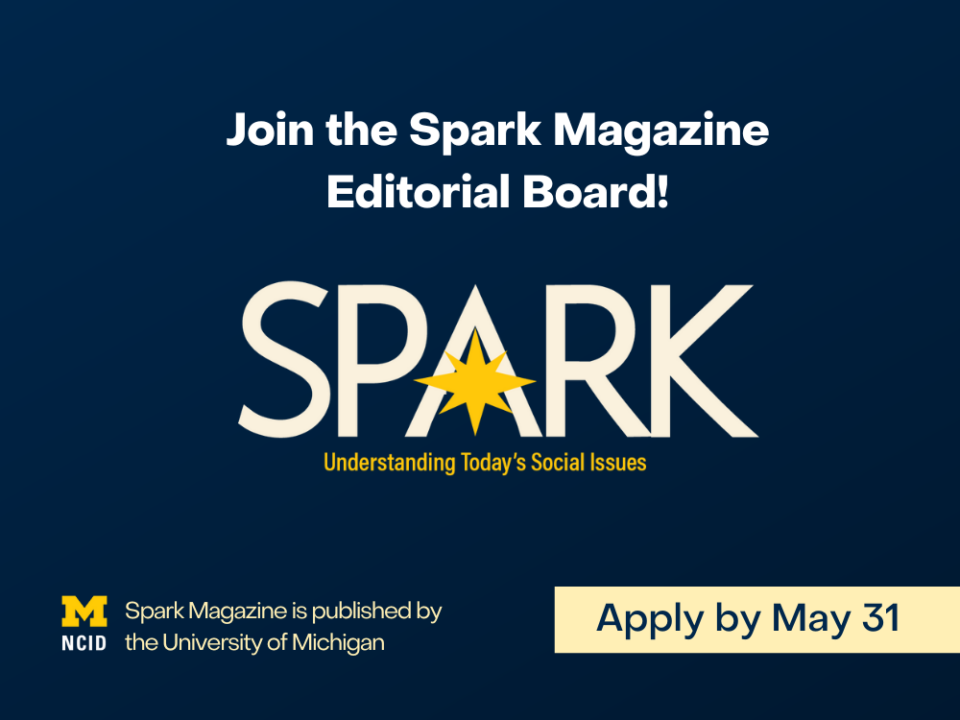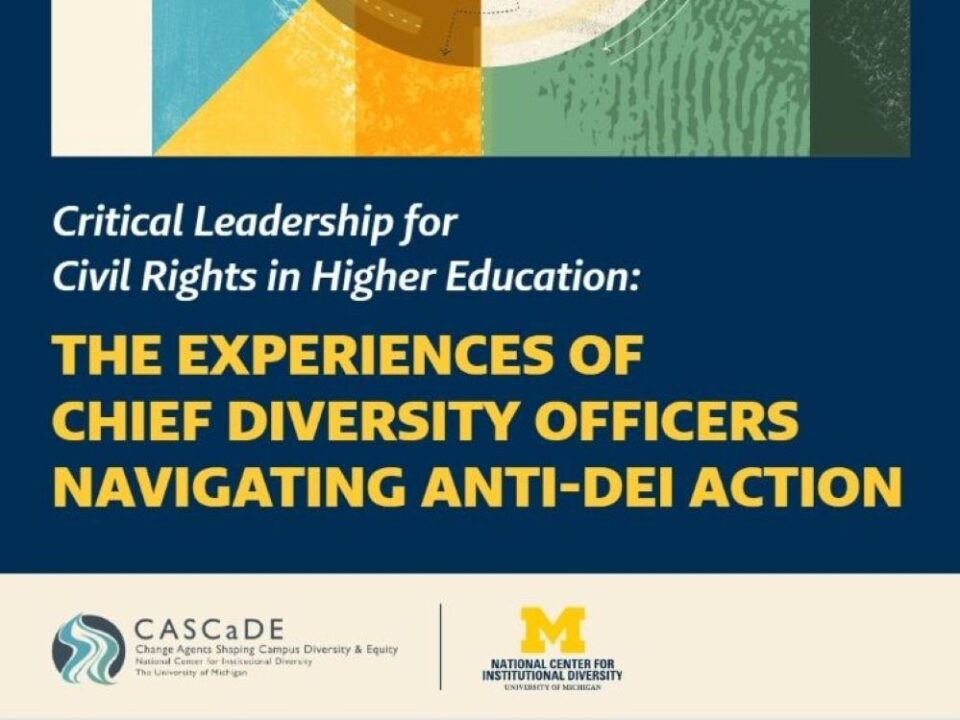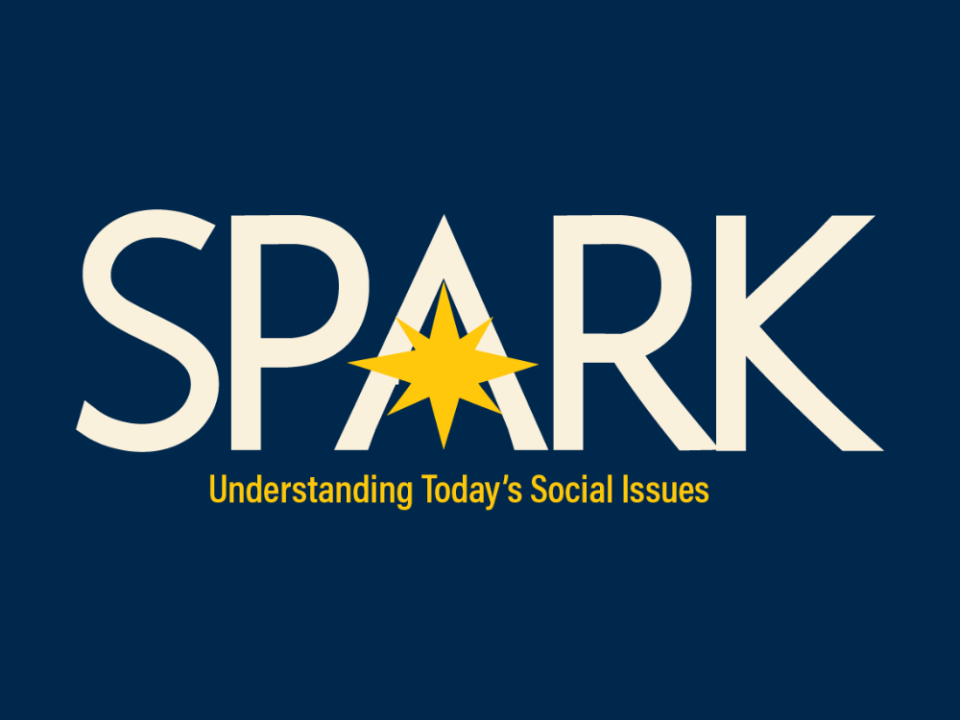- About
- News
- Events
- Initiatives
- Anti-Racism Collaborative
- Change Agents Shaping Campus Diversity and Equity (CASCaDE)
- Diversity Scholars Network
- Inclusive History Project
- James S. Jackson Distinguished Career Award for Diversity Scholarship
- LSA Collegiate Fellowship Program
- University Diversity & Social Transformation Professorship
- Publications & Resources
- About
- News
- Events
- Initiatives
- Anti-Racism Collaborative
- Change Agents Shaping Campus Diversity and Equity (CASCaDE)
- Diversity Scholars Network
- Inclusive History Project
- James S. Jackson Distinguished Career Award for Diversity Scholarship
- LSA Collegiate Fellowship Program
- University Diversity & Social Transformation Professorship
- Publications & Resources

Critical Leadership for Civil Rights in Higher Education: The Experiences of Chief Diversity Officers Navigating Anti-DEI Action
April 8, 2025
Dear Colleagues: How should we be leading higher education today? With boldness, wisdom and courage.
April 15, 2025Coming soon! The CASCaDE Change Agent Empowerment Toolkit
The CASCaDE Change Agent Empowerment Toolkit is a free self-paced digital course series that offers higher education practitioners the opportunity to build their leadership skills in order to improve success outcomes for BIPOC and low-income students on their campuses. The toolkit includes learning, guided reflection, and action-planning resources and tools to help practitioners ensure their efforts contribute to equitable and sustainable transformation at their institutions. Learners will engage in interactive activities and will come away from the course with a fillable PDF workbook to help them reflect and act on what they have learned.
Sign up for email launch and enrollment updates
The CASCaDE Toolkit will be publicly available on May 19, 2025. There is no cost to sign up. Learn more by signing up for emails at the link above.
Who is this for?
Regardless of whether you are in a formal or informal leadership role, we welcome faculty, staff, and administrators who are dedicated to supporting student success. We welcome learners who are interested in creating equity-minded change intended to bolster student success on their campuses! Learners will receive a certificate upon completion of the course series.
About the Curriculum
By participating in the CASCaDE Toolkit, you will gain skills and knowledge across the three domains of the THESIS Model: you will gain proficiency in navigating complex social and political contexts, cultivate a critically conscious approach to your work, and build confidence in using diversity scholarship to plan and advocate for change. The toolkit includes:
- A workbook of activities that help learners identify critical issues and use equity-minded approaches to issues at their institution
- Videos from practitioners sharing their experiences with equitable leadership
- Case studies and real-life examples of inclusive programs and communications
Tools and Activities include…
- Problem of Practice Identification Activity
- Listening-Learning Tour Design Guide
- Power Mapping Analysis
- Data Scavenger Hunt
- And more!
Project Contributors
The CASCaDE Change Agent Empowerment Toolkit is a collaborative effort made possible through the contributions of experts, including those listed below, whose work played a key role in shaping the curriculum.
Katherine S. Cho, Ph.D.
Katherine S. Cho, Ph.D., examines the potential of higher education institutions to positively transform the campus towards equity and the reality that many colleges and universities maintain systems of oppression and (re)manifest harm. More specifically, her research spans across campus activism, institutionalized racism, differential distribution and impacts of labor, and flipping the narrative of “why aren’t students ready for college” to “why are colleges ready for our students.” Currently, she is an Assistant Professor in Higher Education and the Ph.D Director of the Higher Education and International Education program at Loyola University Chicago.
Becky Crandall, Ph.D.
Dr. Rebecca (Becky) Crandall is a Project Director at Rankin Climate, where she leads campus climate projects aimed at fostering inclusive environments through data-informed strategies. A scholar-practitioner with two decades of experience in student affairs and academic roles, her research focuses on student success and development, particularly among intercollegiate athletes and LGBTQ+ students. She also explores how religion and worldview shape campus climate. Her research has been published in outlets such as the Journal of Student Affairs Research and Practice, Journal of Homosexuality, and Journal of College Student Development. She earned her Ph.D. in Educational Research and Policy Analysis with a specialization in Higher Education from North Carolina State University.
Leslie D. Gonzales, Ed.D.
Leslie D. Gonzales, Ed.D., serves as Professor of Higher Education, Department Head of Educational Policy Studies and Practices, and Director for the Study of Higher Education at the University of Arizona. As a working class-Chicana-first-generation college student-turned-academic who earned all three academic degrees from Hispanic Serving Institutions, Gonzales is committed to inclusion and equity in higher education. Gonzales seeks to advance inclusion and equity through 1) her research on the racialized and gendered nature of academic labor and outcomes, 2) meaningful praxis and partnerships, such as department leadership, and 3) service to the profession, and more importantly, to people.
Gene T. Parker, Ph.D.
Eugene (Gene) T. Parker III, Ph.D., is an associate professor of higher education administration in the Department of Educational Leadership and Policy Studies at the University of Kansas. His research focuses on the impact of collegiate experiences on academic and psychosocial student outcomes, such as academic and cognitive outcomes, leadership, and student engagement. This area of research has also centered on the associations between student-faculty interactions, feelings of belonging, campus climate perceptions, and other college student and institutional outcomes. His research interests also focus on organizational and institutional leadership, behaviors, and structures. Dr. Parker teaches courses in organization and governance, college finance, and leadership in higher education. Dr. Parker received his B.A. from the University of Iowa, his MBA from the University of Illinois at Chicago, and his Ph.D. in Higher Education from the University of Iowa.
Amber Williams, M.A., LLMSW
Amber Williams is a doctoral candidate studying academic affairs and student development at the University of Michigan’s School of Education, at the Center for the Study of Higher and Postsecondary Education. Her research explores how antiracism and critical race pedagogies promote racial consciousness in graduate social work education. Prior to her doctoral training, she worked in student and academic affairs and taught as a lecturer in multidisciplinary undergraduate education and social work. In her role as a resources and training coordinator, she co-creates digital curriculum and leadership education materials for the CASCaDE project and co-leads research, such as the Thriving Staff of Color report, which is currently available for download through the CASCaDE homepage.
Arissa Koines, M.A.
Arissa Koines is the CASCaDE Project Lead and creates tools and resources to support the transformation of colleges and universities which seek to improve their performance and eliminate student success gaps by race and socioeconomic status. Previously, Arissa was the Program & Evaluation Manager at the Steve Fund where she oversaw the evaluation and programs for students of color in higher education institutions and nonprofit organizations. She also co-led the Equity in Mental Health on Campus initiative to support institutions in making the mental health of students of color a priority on their campus. Motivated by her own life experiences, Arissa is passionate about supporting and celebrating the unique skills and experiences students of color bring to institutions and communities.
Emma Soberano, M.A., Ph.D.
Emma Soberano is the Instructional Design Coordinator for the CASCaDE Project. In this role, she creates instructional materials intended to help higher education practitioners support BIPOC and low-income student success. She enjoys working with content matter experts, translating complex scholarship into plain language, and creating engaging and appealing asynchronous online learning experiences. Emma earned her Masters and Ph.D. in English Language and Literature from the University of Michigan, where her research and teaching tackled race, ecology, epistemology, and empire in 19th century British literature and neo-Victorian literature.
Leslie Vernon-Dunnigan, M.A.
Leslie Vernon-Dunnigan is a doctoral student in the joint Psychology and Women and Gender Studies program at the University of Michigan, advised by Dr. Elizabeth Cole in the Feminist Antiracist Methods lab. After earning a bachelor’s degree in psychology from California State University, Sacramento, with a focus on quantitative psychology and research methodology in 2021, Leslie pursued a master’s degree in psychology from the same university, completing their thesis under Dr. Zach Schudson in the Psychology of Gender and Sexuality Lab in 2024. Their research explores the relationship between identity and social issues through two lines of inquiry: the relationship between history and identity, and evaluating the essentializing of Blackness within the Americas.




